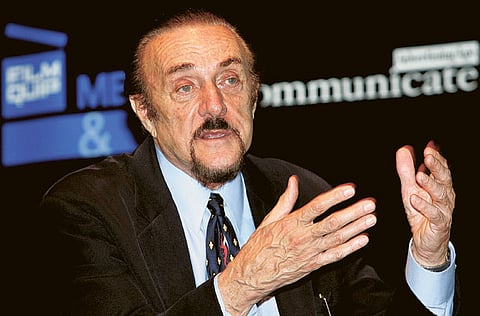Good, bad and human nature
Dr Phillip Zimbardo's life is a quest to make people understand the power of evil and awaken the inner hero in them

You do not have to possess special powers to be a hero, nor is it necessary to have the ability to sing beautifully or be extra-gorgeous. To be a hero all you have to do is stand up and speak out when others fail to.
Trying to bring out the inner hero in us all is the new mission in world-renowned psychologist Dr Phillip Zimbardo's life, and he aims to do it through the Heroic Imagination Project (HIP).
Not one to shy away from big questions, Dr Zimbardo, on a recent visit to Dubai for the 2011 BOLDtalks, tackled the topic of what makes good people do bad things. He followed it up with a discussion about his 2007 book The Lucifer Effect: Understanding How Good People Turn Evil.
A topic central to his career and reminiscent of his 1970s' controversial Stanford Prison experiment, the project is aimed at studying human nature.
The prison experiment involved paying 24 random students to take on the roles of prisoners and prison guards in a makeshift prison in the university's basement. The two-week experiment was stopped after only six days because of the psychological breakdown it caused the students.
Those appointed as the prison guards became sadistic and cruel and those the prisoners hysterical and depressed.
"I regret I didn't end the study sooner and allowed it to go on for six days. I should have ended it on the second day, after the second prisoner broke down," Dr Zimbardo told Weekend Review.
Analysing behaviour
Although Dr Zimbardo openly admits in his books to still feeling guilty about the trauma the experience caused the students, he said he would not take it back.
"It illuminated something central in human nature," he said. "We all like to believe we are good and in control of our destiny but when you put good people in a bad situation it dominates us."
Dr Zimbardo, a professor at Stanford University since 1968, has been a student of psychology for more than 50 years, and it was the world's evil that took him down that road, he said.
Growing up poor in a New York City ghetto, Dr Zimbardo was surrounded by evil as a child. "Growing up where I did, there was evil all around — prostitution, drugs, violence, gambling, you name it," he said. "I always wondered why some of my friends got involved in that stuff and why others resisted."
His life-long quest for answers on human nature have been central to his research studies and have driven him through his career — right up to his latest project, HIP.
"We are interested in making people aware of the power of evil, which can corrupt any of us," he said. "Its job is to corrupt people, and there are evil people everywhere — drug dealers, gang leaders, cigarette-company advertisers — and they are influential and organised, while heroes are not."
Therefore, the aim of HIP, a non-profit organisation, is to reach out to youth and adults and encourage them to focus on their fellow humans. The idea is to bring out the hero lying dormant inside.
"A hero is someone, anyone, who takes action intentionally on the behalf of others in need or in defence of a moral cause, and they do it without expecting a reward," Dr Zimbardo explained. "So that eliminates celebrities and sports figures, as most heroes are just ordinary people."
By Dr Zimbardo's definition, a child who sticks up for another who is being bullied is a hero, as anyone who tries to put right something they sense to be wrong, no matter how trivial, is a hero.
"There is evil in inaction," he said. "Heroes don't have to have special qualities, they simply have to be willing to act when most others fail to."
Lessons on taking a stand
HIP is primarily operated through the website www.heroicimagination.org and develops lessons to help a primarily young audience become wise and effective heroes. The focus is to speak to the youth of the 21st century in a language they understand. "We think we can do this through the power of the internet and the power of mobile phones," Dr Zimbardo said. "We've developed materials all over the world which focus on the use of lots of video clips, as our audience is mainly young people."
The suggested exercises for developing one's inner hero on HIP are as unconventional as Dr Zimbardo. One of these is to walk around all day with a big black dot on your forehead. The idea is to stand firm on what you believe, even though others do not understand it.
"Some may feel like such an exercise is not important but what you will realise is just how much pressure people put on you for just being yourself and not who they want you to be," he said.
Not straying far from his roots in academia, through HIP, Dr Zimbardo also wants to develop research on heroism. He believes it is important to move away from popular notions of heroes as fictional comic-book characters such as Batman or Superman.
"There is no research on heroism but there is lots of research on what makes people do bad things; so we'd like to get money to give grants for heroism research around the world," Dr Zimbardo said.
Again the underlying fascination driving Dr Zimbardo's work becomes clear — the reason people do evil things.
Although some may argue the theological, the-devil-made-me-do-it perspective, Dr Zimbardo remains unconvinced and believes in pursuing more tangible answers.
"I don't think we need to go to cosmological explanations, but instead ask what roles our parents, teachers and governments play in shaping who were are," he said.
Sign up for the Daily Briefing
Get the latest news and updates straight to your inbox



